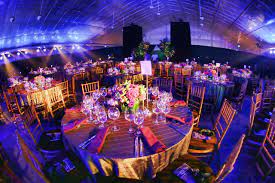The Power of Events: Bringing People Together
Events have a unique ability to bring people together, creating memorable experiences and fostering connections that can last a lifetime. Whether it’s a music festival, a sporting event, a conference, or a community gathering, the impact of events on individuals and society as a whole is profound.
One of the key aspects of events is their ability to create a sense of community. When people come together to celebrate a shared interest or passion, they form bonds that transcend geographical boundaries and cultural differences. This sense of belonging can be incredibly powerful, providing individuals with a support network and a feeling of unity.
Events also have the power to inspire and educate. From keynote speeches at conferences to art installations at exhibitions, events offer unique opportunities for learning and personal growth. They expose attendees to new ideas, perspectives, and experiences that can broaden their horizons and challenge their assumptions.
Furthermore, events play a crucial role in driving economic growth and tourism. Major events such as international conferences or music festivals can attract thousands of visitors from around the world, stimulating local businesses and creating job opportunities. In this way, events have the potential to revitalise communities and boost their economies.
In today’s digital age, where much of our communication takes place online, events provide an invaluable opportunity for face-to-face interaction. They allow people to connect on a deeper level, to share stories and experiences in real time, and to build relationships that go beyond virtual connections.
In conclusion, events are not just gatherings; they are powerful catalysts for change and connection. By bringing people together in meaningful ways, events have the ability to shape our world for the better.
Essential Information for Attendees: Key Questions Answered About the Upcoming Event
- What is the date of the event?
- Where is the event taking place?
- What time does the event start and end?
- Is there a dress code for the event?
- Are tickets required for the event? If so, how can I purchase them?
- What activities or programs are scheduled for the event?
What is the date of the event?
One of the most frequently asked questions about events is, “What is the date of the event?” This seemingly simple query holds significant importance as it serves as the foundational piece of information that attendees need to plan their schedules and make necessary arrangements. Knowing the date of an event allows individuals to mark their calendars, coordinate with others, and ensure they do not miss out on a valuable opportunity to participate in a memorable experience. The date of an event acts as a starting point for all logistical considerations and plays a crucial role in creating a successful and well-attended gathering.
Where is the event taking place?
The location of an event is a crucial detail that sets the stage for a memorable experience. Knowing where an event is taking place not only helps attendees plan their logistics but also adds to the anticipation and excitement surrounding the occasion. Whether it’s a bustling city centre, a scenic outdoor venue, or a historic landmark, the choice of location can significantly impact the atmosphere and overall vibe of the event. From grand conferences to intimate gatherings, the venue serves as a backdrop that enhances the significance of the event and creates lasting memories for all who attend.
What time does the event start and end?
One of the most commonly asked questions regarding events is, “What time does the event start and end?” Knowing the precise timing of an event is crucial for attendees to plan their schedules effectively and ensure they don’t miss any key moments. The start time sets the tone for the event, while the end time allows attendees to make arrangements for their departure and ensures they can fully participate in all activities. Clear communication of event timings helps create a seamless and enjoyable experience for all involved, promoting efficiency and enhancing overall satisfaction with the event.
Is there a dress code for the event?
When it comes to the question of whether there is a dress code for the event, it is essential to check the event invitation or website for specific guidelines. Dress codes can vary depending on the type of event, ranging from formal attire for galas and black-tie events to casual wear for outdoor festivals or networking gatherings. Adhering to the dress code not only shows respect for the event organisers but also helps create a cohesive atmosphere among attendees. If in doubt, it is always advisable to err on the side of caution and dress slightly more formal than you think necessary to ensure you are appropriately attired for the occasion.
Are tickets required for the event? If so, how can I purchase them?
One of the most common queries regarding the event is whether tickets are required for attendance and, if so, how they can be obtained. Tickets are indeed necessary for entry to the event to ensure a smooth and organised experience for all attendees. Purchasing tickets can typically be done through various channels, such as the event’s official website, authorised ticketing platforms, or designated physical ticket outlets. By securing your tickets in advance, you can guarantee your spot at the event and avoid any last-minute hassles or disappointments.
What activities or programs are scheduled for the event?
Attendees often inquire about the activities or programs scheduled for the event as they seek to plan their participation and make the most of their experience. Knowing what to expect in terms of workshops, performances, speakers, and other offerings helps attendees tailor their schedule and ensure they don’t miss out on key highlights. By providing a clear outline of the event’s schedule and program lineup, organisers can enhance attendees’ anticipation and engagement, ultimately contributing to a more fulfilling and memorable event experience for all involved.

